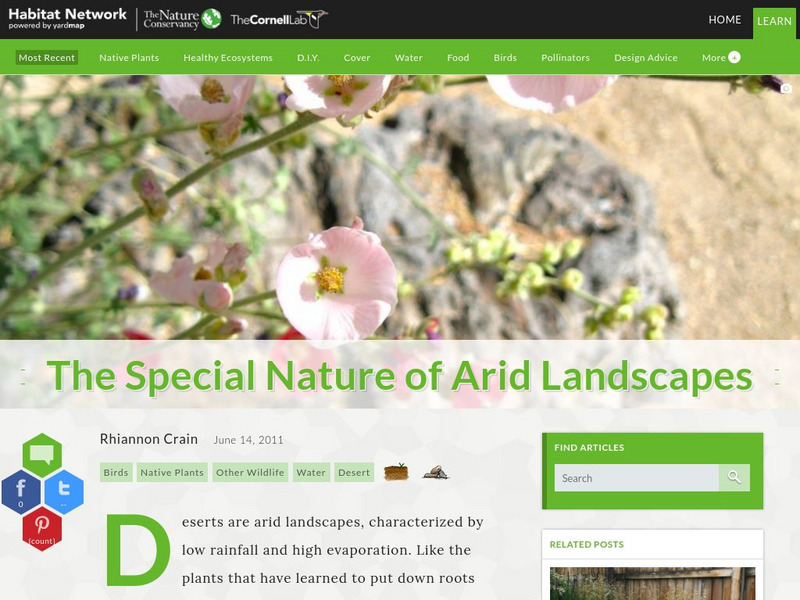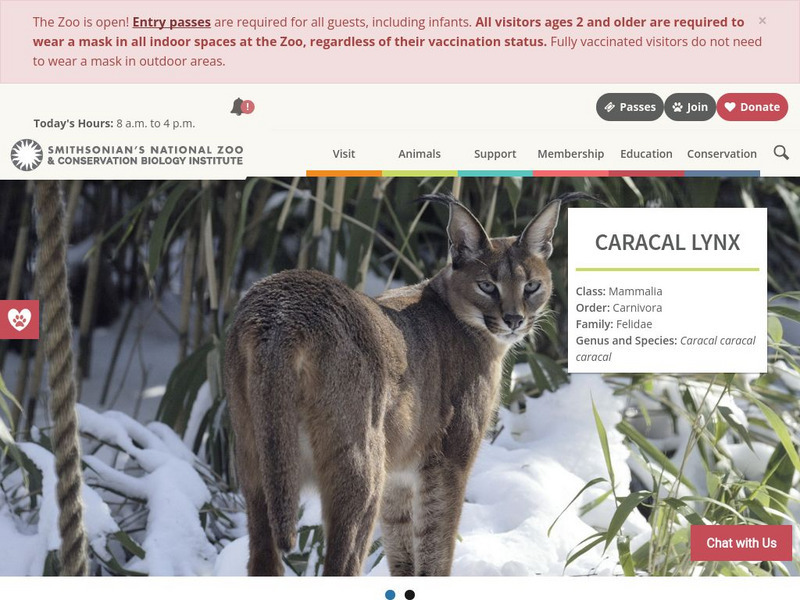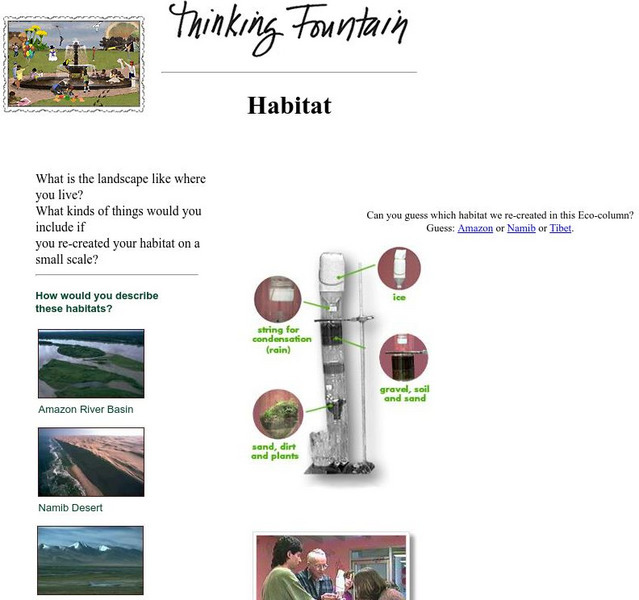Hi, what do you want to do?
Enchanted Learning
Enchanted Learning: Desert
Students will enjoy a general description of a desert habitat, an easy-to-understand chart of the largest deserts in the world, and brightly colored pictures and descriptions of desert animals complete with printouts. There is also a...
National Geographic Kids
National Geographic Kids: Animals: Bactrian Camel
Great site for youngers researching the Bactrian camel. Video clip, photos, and easy to read facts about habitat, young, enemies, food, adaptation to environment, and humps!
Curated OER
National Park Service: Arches National Park: Animals
A resource where you'll learn about amphibians, birds, mammals, and reptiles at Arches National Park in Moab, Utah. A good look at how animals live, sleep, eat, and stay active in a desert habitat.
The Wild Classroom
The Wild Classroom: Biomes of the World: Desert Scrub Biome
Learn about the desert scrub ecosystem. Find out about plants, animals, adaptations, and conservation efforts.
World Wildlife Fund for Nature
World Wildlife Fund: Our Earth: Ecoregions: Habitats: Deserts
An overview of the climate conditions of deserts. Includes examples of plants and the adaptations that allow them to survive in the dry climate. Includes a link to information about animals that live in a desert habitat.
Cornell Lab of Ornithology
Habitat Network: The Special Nature of Arid Landscapes
Find out how to make the most of a desert environment in order to foster a wide array of species diversity.
San Diego Zoo Global
San Diego Zoo: Desert Tortoise
This excellent resource from the San Diego Zoo presents extensive information on the desert tortoise including details about its habitat, physical characteristics, size, diet, family life, conservation status, and fun facts.
PBS
Pbs Learning Media: Desert Elephants
In this video from Nature, observe elephants trek across the desert to an isolated waterhole. [4:13]
A-Z Animals
A Z Animals: Reference: Habitats: Desert
This entry identifies the defining characteristics of the desert.
Other
Greatest Places: Namib
Explore the Namib Desert and learn about its location, the Skeleton Coast, mirages, and general information about this home to the highest sand dunes in the world.
A-Z Animals
A Z Animals: Animal Facts: Desert Tortoise (Gopherus Agassizii)
Explore the world of the Desert Tortoise and discover information on the physical characteristics, habitat, and breeding of this desert reptile. Includes images and statistics.
PBS
Pbs Kids: Feed the Dingo
Help build the Australian desert ecosystem by filling it with appropriate plants and animals.
Regents of the University of Michigan
Animal Diversity Web: Peromyscus Eremicus (Cactus Mouse)
The Animal Diversity Web describes the natural history of the cactus mouse, including its geographical range, physical characteristics, natural habitat, reproduction, and behavior.
PBS
Pbs Nature Critter Guide: Llama
Learn more about llamas when you check out this resource. This site features a clear and concise picture of how these fascinating mammals live and what purpose they serve to other animals and humans.
ClassFlow
Class Flow: Sonoran Desert
[Free Registration/Login Required] This flipchart is an introduction/review of the climate, the plant life and the animals of the Sonoran Desert. Students will use Activotes, the eraser tool and the pen tool to answer questions about how...
Smithsonian Institution
Smithsonian National Zoo: Caracal
The Smithsonian National Zoo offers a fact sheet on the Caracal. Content includes a look at the caracal's home range, habitat, diet, reproduction, social structure, and life span.
San Diego Zoo Global
San Diego Zoo: Caracal
This excellent resource from the San Diego Zoo presents extensive information on caracals including details about their habitat, physical characteristics, size, diet, family life, conservation status, and fun facts.
Other
Arizona Game and Fish Department: Big Game Species
Detailed information on a variety of big game that are hunted in Arizona. Includes each animal's life history, their hunt history, behavior, and a chart listing facts, e.g., habitat, predators, etc., as well as a narrated video of them...
The Association of the British Pharmaceutical Industry
Abpi: Human and Animal Habitats
An interactive learning game where students answer whether or not certain environments would be suitable for different animals. Printable worksheets are available for review at the end of the activity.
The BIG zoo
The Big Zoo: Bactrian Camel (Camelus Bactrianus)
This site provides a general overview of the Bactrian camel. Content details this animal's diet, habitat, social structure, and predators.
The BIG zoo
The Big Zoo: Dromedarian Camel (Camelus Dromedarius)
This site provides a general overview of the dromedary camel. Content explores what this animal eats, its desert habitat, existing social structure, and more.
Science Museum of Minnesota
Science Museum of Minnesota: Thinking Fountain: Habitat
Explore the basics of a few habitats and then create an ecocolumn--a simulated cross-section of a biome such as a rain forest--with your own environment.
BBC
Bbc Science & Nature: Cheetah (Acinonyx Jubatus)
Here are some awe inspiring photos of cheetahs. Included you can also find a fact sheet detailing such things as: physical description, distribution, habitat, statistics, and more.
Utah Education Network
Uen: Utah's Plants and Animals Do You Know Where I Live?
Can you figure out what types of biomes different organisms belong in? You'll be presented with a variety of organisms and asked which of three biomes they belong in.





















